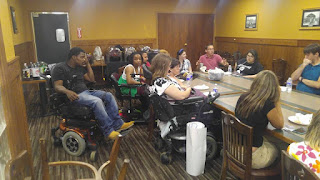ADAPT Demands Sen. Alexander protect the health care of Tennesseans
By Allison Donald
The Senate has delayed the vote on a replacement to the Affordable Care Act. However, this week remains critical as Senate leadership will continue trying to cut deals with senators to get to 50 votes. People with disabilities need to make it clear that Medicaid is essential to us remaining in ours homes and in the community and should not be part of any reform or replacement. The bill at its core is a tax cut for wealthy at the expense of healthcare for the rest of us.
Mid-South ADAPT along with allies from the Tennessee Justice Center, Indivisible Memphis, Black Lives Matter, and the Memphis Coalition for Concerned Citizens visited the office of Senator Lamar Alexander. We were there representing the 1.6 million Tennesseans who get comprehensive affordable health coverage through Medicaid. Our demand is simple. We want Senator Alexander to vote no to the Better Care Reconciliation Act and protect the liberties of Tennesseans especially Medicaid.
“The proposed cuts to Medicaid,” said Mid-South ADAPT activist Michael Heinrich, who was arrested and dragged out of Speaker Mitch McConnell’s office last month, “will result in people paying more for healthcare coverage, but receiving less services.”

Fourteen activists filed into the office of Senator Lamar Alexander and took seats on the floor. We began to demand to speak with someone in the Washington DC office that had a direct line to Senator Alexander. Mary Wooldridge the constituent representative took notes as each individual explained how the proposed cuts to Medicaid would affect their life. Ms. Wooldridge, who is retired, said the healthcare issue doesn’t affect her because her coverage is from the phone company. The issue did not concern her.
After all of the personal testimonials were done Allison Donald repeated the demand for Ms. Wooldridge to get someone from the Washington DC office on the phone. She then stated that she could not do so.
“I will make 201 Poplar my home,” said Allison Donald the organizer for Mid-South ADAPT, “before I go into a nursing home.”
At that point the exchange ended. The sit-in began and ADAPT was not going anywhere. We were in the office for about 30 minutes a security officer and an officer from the Department of Homeland Security entered and informed us that there were too many people in the office and that only four of us could be in the office at a time. Four people choose to stay: Tim Wheat (ADAPT), Michael Heinrich (ADAPT), Allison Donald (ADAPT), and Karen Spencer McGee (BLM).
Ms. Wooldridge, who claimed that she was not able to get in contact with the Washington DC office, had her phone ring and Senator Alexander’s Washington DC office was on the other end. Allison Donald made arrangements to speak with Brandon Morton the scheduler for Lamar Alexander.
Officer James of Homeland Security informed us that we could not wait for the final arrangements in Senator Alexander’s office while Ms. Wooldridge conducted business. He also stated that we could not protest inside of a federal building. About fifteen minutes passed and Officer James issued his first warning for us to leave the office or be arrested.
With the contact information in hand, the ADAPT activists met our colleagues downstairs to discuss the next steps.













